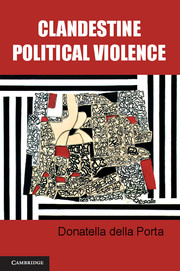Book contents
- Frontmatter
- Contents
- Acknowledgments
- Acronyms
- 1 Political Violence and Social Movements
- 2 Escalating Policing
- 3 Competitive Escalation
- 4 The Activation of Militant Networks
- 5 Organizational Compartmentalization
- 6 Action Militarization
- 7 Ideological Encapsulation
- 8 Militant Enclosure
- 9 Leaving Clandestinity?
- 10 Clandestine Political Violence
- Primary Sources
- Bibliographical References
- Index
6 - Action Militarization
Published online by Cambridge University Press: 05 April 2013
- Frontmatter
- Contents
- Acknowledgments
- Acronyms
- 1 Political Violence and Social Movements
- 2 Escalating Policing
- 3 Competitive Escalation
- 4 The Activation of Militant Networks
- 5 Organizational Compartmentalization
- 6 Action Militarization
- 7 Ideological Encapsulation
- 8 Militant Enclosure
- 9 Leaving Clandestinity?
- 10 Clandestine Political Violence
- Primary Sources
- Bibliographical References
- Index
Summary
ACTION MILITARIZATION: AN INTRODUCTION
The ETA used kidnappings to demand policy decisions, and sometimes also money. Their use increased from one per year in 1970 and 1973, two in 1976, and one in 1977, to four, eight, and seven respectively in 1978, 1979, and 1980. The lethality of the kidnappings also grew as the motive behind them changed, moving from a logic of negotiation to one of punishment.
In the beginning, kidnappings were staged as Tupamaros-style actions, which ended with the liberation of the hostage. So, for instance, in 1970, the ETA kidnapped the honorary West German consul in San Sebastian, Eugen Beihl, asking for the release of fifteen ETA members on trial, but then freed him before the special tribunal decided on the case. In 1971, the owner of a factory on strike, Lorenzo Zabala Suinaga (who was of Basque origin and spoke Euskera), was held prisoner by the Basque separatists; he was asked to rehire without sanctions all workers, as well as to grant wage increases. The kidnapping of Zabala was a turning point toward a workers’ movement, justified by the ETA’s journal Zutil with the words, “All bosses are the same for us . . . whether they have Basque surnames or not changes nothing. . .. All of them exploit us” (Pérez-Agote 2006: 65). He was also released after all conditions had been met. The kidnapping of Felipe Huarte in January 1973, also during a labor conflict, was similar; in exchange for his freedom an $800,000 ransom was requested.
- Type
- Chapter
- Information
- Clandestine Political Violence , pp. 174 - 203Publisher: Cambridge University PressPrint publication year: 2013

